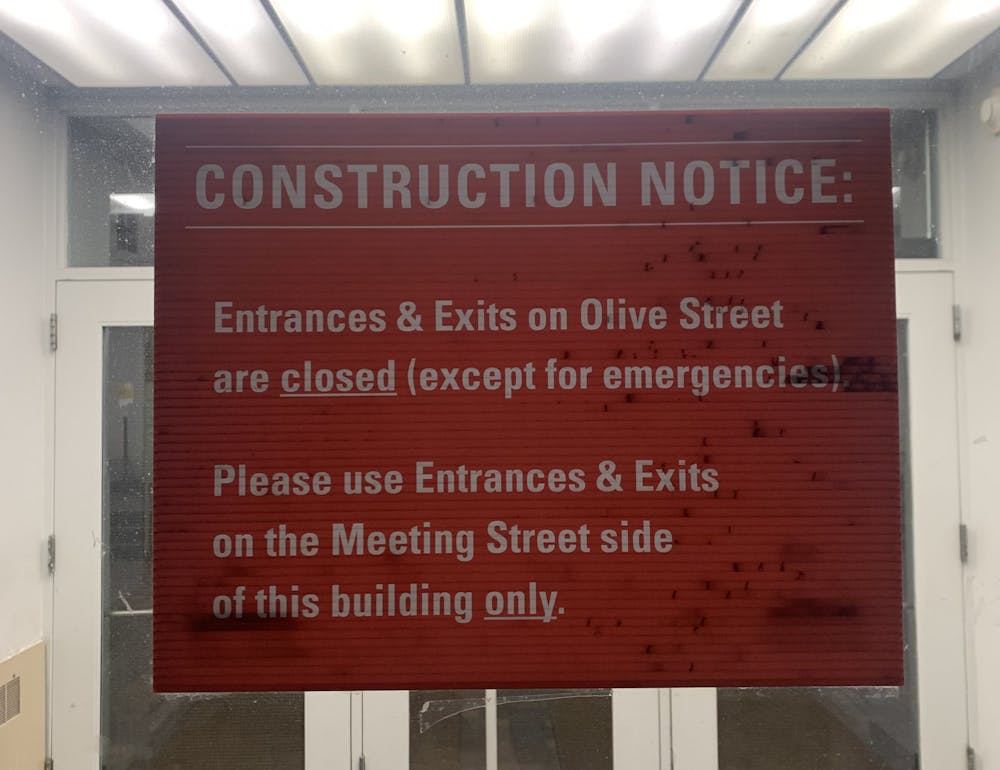The weekend of Feb. 3 saw a cold snap that caused damage to the Biomedical Center on 171 Meeting Street. Restoration efforts for the complex are currently underway and are expected to be complete by the end of April — a roughly eight-week period of repairs, according to an email sent to The Herald by Vice President of Facilities Management Michael Guglielmo Jr.
Damages occurred on floors one through three of the building, according to Guglielmo. Several pipes froze, resulting in leaks and water damage to the drywall and flooring.
The Department of Facilities Management partnered with the Division of Biology and Medicine’s Facilities Planning & Operations team and the University’s Environmental Health & Safety office to evaluate the damage and develop a plan to restore the affected areas, Guglielmo wrote. Significant renovations include removing wet materials and replacing damaged equipment. The building houses four floors of research space and two for teaching and laboratories.
“The work includes ongoing drying and moisture monitoring,” Guglielmo wrote. “Once restoration is complete and the spaces are ready for re-occupancy, air clearance testing will be performed per EH&S guidelines and all furniture will be cleaned and returned.”
“Although it is unfortunate that this incident occurred … staff across Facilities, as well as FPO and EH&S, jumped in quickly to support the academic mission of Brown,” Guglielmo wrote.
FPO acted as first responders, “finding and isolating the damaged pipe” and “providing oversight during the initial clean-up and system repairs,” according to Guglielmo.
The restoration plan calls for areas on the third floor to be repaired first, followed by the second and first floors.
Rebecca Kartzinel, lecturer in biology, ecology, evolution and organismal biology and director of the Brown University Herbarium, wrote in an email that her working space faced the effects of the damage. Following the extreme weather, water leaked through the ceiling of the Herbarium’s front workroom, though most of the damage in the suite occurred to the infrastructure of the building itself, with water in the floors, walls and ceiling tiles.
Kartzinel wrote that she feels fortunate that “very little” was lost in the way of materials, books and equipment.
“The main impacts to me and the Herbarium staff have been the time lost to cleaning up after the flooding itself and moving out of the workrooms and offices” while restorations continue, Kartzinel wrote. As of last week, the offices and workroom were “completely emptied for repairs.”
While she waits for repairs to complete over the next one to two weeks, Kartzinel has used “alternative places” to work. Some Herbarium staff have set up a temporary workspace elsewhere within the Biomed Center, while also completing some of their work from home.
The Division of Biology and Medicine’s FPO team is an “integral part of managing the needs of faculty and helping to plan the work so that it doesn’t impact research activities,” Guglielmo wrote, noting that FPO has worked to relocate researchers.
Edith Mathiowitz, professor of medical science and engineering in the Department of Pathology and Laboratory Medicine, works on the third floor of the Biomed Center. Although Mathiowitz’s lab space was not affected by the cold snap, her office was put out of use. This makes meetings with students difficult, as there is only one functioning seminar room available for all of the faculty in the department, she said.
Mathiowitz said she thinks the space most “terribly affected” for research purposes is the special area set aside for expensive microscopes used in the labs.
Eric Darling, associate professor of medical science, engineering and orthopedics, has a lab, office and secondary workrooms spread through the third floor of the Biomed Center. Darling wrote in an email to The Herald that flooding from broken pipes primarily affected his office, requiring the removal of all furniture, carpeting and lower sections of the walls.
Darling’s research group was “largely unaffected in our ability to pursue” its projects, though his group has experienced delays in “using collaborators’ equipment that was in affected spaces,” he wrote.
“Not being in my normal office over the past couple months has also slowed a lot of things down that needed to go through me,” he wrote.
Although the cleanup and restoration of offices within the building led to displacement, which has been difficult, “we’re all doing the best we can to keep everything moving forward while the repairs are being completed,” Darling wrote.
Darling added that his research group was “very fortunate” because their primary lab space was not affected by the water damage, though other researchers in the building had to move their equipment so damaged walls could be replaced.
“It’s a pain, but this is not something we could plan in advance,” Mathiowitz said. “And hopefully they will take in all of the isolation systems so that this won’t happen again.”
“I don’t think I can blame anyone but nature,” she added.
“It was remarkable the building still managed to be reopened within a day of the flooding,” Kartzinel wrote. “I’m sure the building would be in much worse shape if not for (Facilities’s) efforts.”
“We are all managing. Everyone is working under a lot of stress right now,” Mathiowitz said. “I don’t know all the details of the restoration, but I do see progress.”
Robayet Hossain is a Science and Research staff writer focusing on up-and-coming research and departmental updates. He is a first-generation sophomore from Bangladesh and graduated in New Orleans. He loves listening to a variety of music genres and reading horror stories just to have problems falling asleep.





